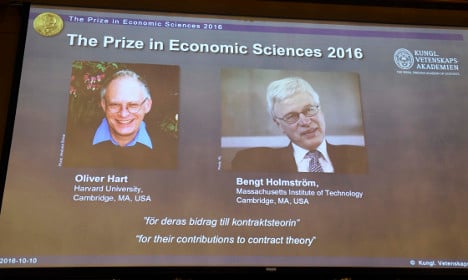Helsinki-born Bengt Holmström, of the Massachusetts Institute of Technology and London-born Oliver Hart of Harvard University were revealed as the winners of the 2016 Nobel Prize in Economics at the Royal Swedish Academy of Sciences in Stockholm on Monday.
“I was very surprised and very happy,” said Holmström when interviewed by Swedish and international journalists over a phone link immediately after the prize announcement.
The duo will split eight million kronor ($924,000) in prize money.
“This prize is about contracts. A fundamental phenomenon which impacts most of us,” Nobel Committee member Per Strömberg explained at the start of a breakdown of the prize-winning research.
“In the late 1970s Holmström’s informativeness principle stated precisely how a contract should link an agent (a company’s CEO) to performance-relevant information,” the Royal Swedish Academy of Sciences said in a press summary.
“He showed how the optimal contract carefully weighs risks against incentives,” it added.
Born in Finland, Holmström initially moved to Stanford, California as an exchange student. While there he started doing research on understanding problems in the business world. He eventually ended up staying in the US, and went on to become a world-famous researcher in his field.
His fellow 2016 Nobel Economics Prize winner Hart came to the US in the 1970s to do his PhD at Princeton University. Initially focusing on more theoretical work, the Brit eventually started to specialize in ownership in business, turning him towards the field of contracting in which he would ultimately win a Nobel Prize.
“Hart made fundamental contributions to a new branch of contract theory that deals with the important case of incomplete contracts,” the Royal Swedish Academy of Sciences said.
His findings on incomplete contracts “shed new light on the ownership and control of businesses and have had a vast impact on several fields of economics as well as political science and law,” they added.
One of the big topics of the phone interview with Holmström following the prize announcement was whether huge bonuses should be paid to CEOs, and the newly-named Nobel Laureate said it was a tricky question.
“It's a very complicated problem,” says Bengt Holmström when asked if you should pay big bonuses to CEOs.
— Emma Löfgren (@ekjlofgren) October 10, 2016
The Local spoke to Nobel Committee member Mats Persson about the subject in more detail.
“Your common sense tells you that it’s insanity, but it’s not. The CEOs are employed to do good things for the company, and if the bonus programmes are designed in a sensible way then that’s good. But often they’re not sensible, which this research could help highlight,” he said.
“There’s also power play and perhaps company leaders don’t want a sensible bonus programme because then they can’t steal money from the shareholders. But if they don’t get the money, who should then get it? Maybe the shareholders, but why? If the bonuses could incentivize the CEO to do a good job, then it makes sense that he gets them.”
'Why is it that Europe's top scientists work in the US?' queries Nobel Committee member Mats Persson. Good question! pic.twitter.com/ku5f14i9RU
— Emma Löfgren (@ekjlofgren) October 10, 2016
While this year’s prize-winning research may seem less noble to some than last year’s, which was on measuring poverty, Persson believes it is still important nonetheless.
“This doesn’t save the world, but everything that makes the economy work better is good in some way. How should you design bonus programmes? It’s good, isn’t it, if they (companies and company leaders) don’t run off and do crazy things?”
As for how Holmström and Hart reacted to being told they had won the 2016 Nobel Prize in Economics, Persson questioned whether top level economists like the duo are genuinely surprised when they win the big award.
“They always say they’re surprised, but is it genuine or an act? Researchers at this level know they are playing on this level,” he insisted.
“It’s funny when you phone them up in the morning. It’s 5am in the US and they’ve just woken up. It’s good to have someone on the committee who knows them and can convince them it’s not an April Fools’ joke.”
Article by The Local's Emma Löfgren and Lee Roden


 Please whitelist us to continue reading.
Please whitelist us to continue reading.